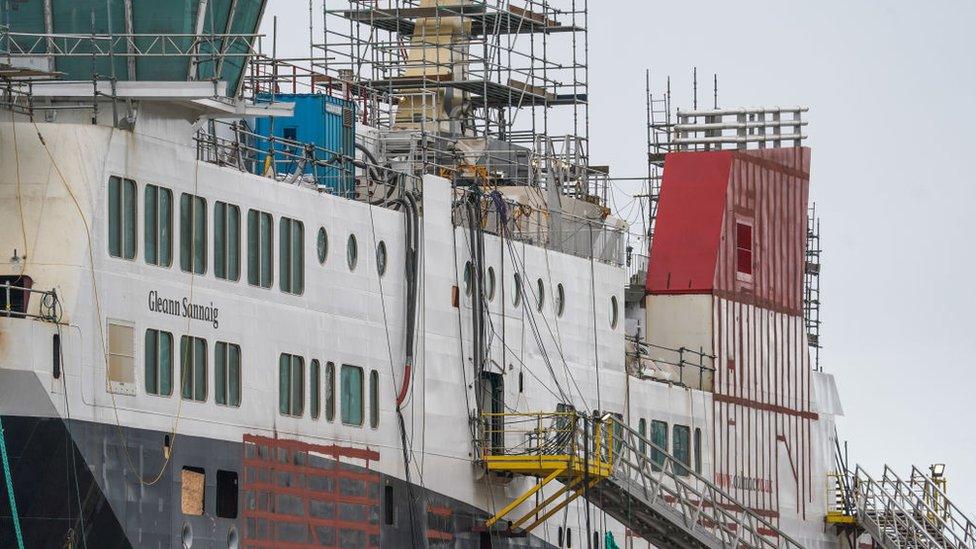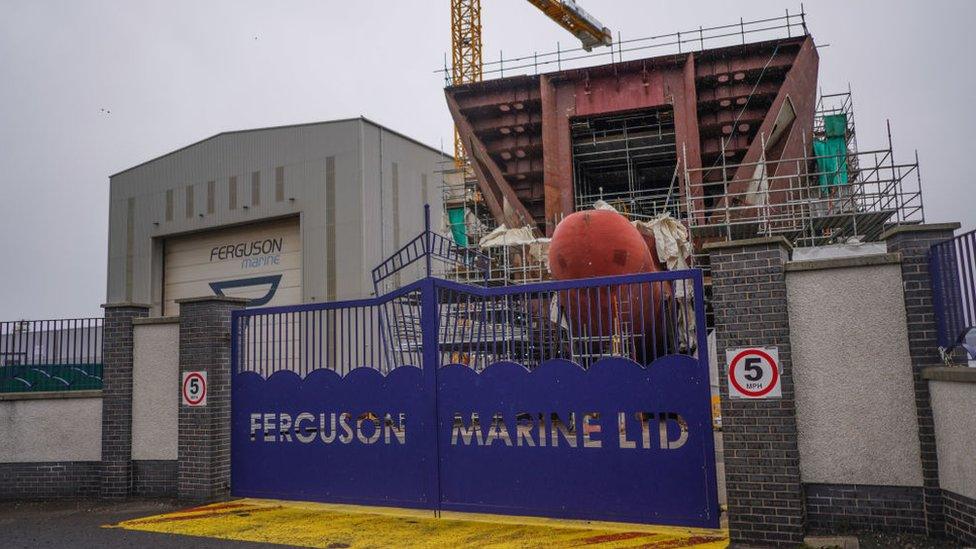Bosses at ferry fiasco shipyard to receive bonuses
- Published

The project to build the two CalMac ferries is £200m over budget and six years behind schedule
Bosses at the troubled Clyde shipyard building two delayed and over-budget ferries will continue to receive bonus payments, MSPs have been told.
It emerged earlier this year that six executives at the nationalised Ferguson yard were awarded a total of £87,000.
First Minister Humza Yousaf has previously said he was angry about the payments and that bonuses should not be paid in future.
But the yard's chairman said the payments were "contractual".
Andrew Miller told Holyrood's Public Audit Committee that without such payments "the future of Ferguson Marine yard is at risk" and described them as "retention payments".
He said they would need to continue to be paid "because they're contractual, they're points of law and it is very difficult to say to somebody that we are just pulling that from your contract".
Mr Miller added: "It is very important we find the talent for the senior management. It is also very important we retain the talent for the senior management, in terms of completing our journey towards eventual profitability in our five-year plan.
"That is all very important to achieve. We have got to be competitive."
In a report to the Scottish Parliament in March, public spending watchdog the auditor general said it was "unacceptable" the bonus payments to the six executives in the 2021/22 financial year had not been cleared by the Scottish government.
The report added: "There was a lack of transparency and good governance around the assessment and approval of these payments".
The money is understood to have been paid under former turnaround director Tim Hair, who was recruited by the government after the yard was nationalised in 2019.
Mr Yousaf said in April that he "shared the anger" at the payments being made and that "for any future discussion or consideration of bonuses, I have made it clear there should not be bonuses paid" in relation to the two ferries.
Responding to Mr Miller's comments, a Scottish government spokesman said the bonus arrangements were signed off by the Ferguson Marine board without its knowledge.
He added: "The first minister previously made clear his anger at these payments and had sought advice as to whether they could be stopped.
"However - as we have already outlined - they form part of legacy employment contracts meaning they have been contractually unavoidable."
A review of remuneration and reward arrangements for 2023/24 is being carried out in consultation with the government and is expected to conclude by the end of July.

There has been controversy over salaries and bonuses paid to senior staff at the Ferguson yard since it was nationalised
The two CalMac ferries - the Glen Sannox and another boat currently known as Hull 802 - were ordered in 2015 when Ferguson Marine (FMEL) was owned by Jim McColl, a pro-independence businessman who had rescued the Port Glasgow yard from administration a year earlier.
The project soon ran into trouble, with the yard being taken over by the Scottish government in 2019, and the ships are now more than £200m overbudget and due to be delivered six years later than originally planned.
Mr McColl and the government-owned ferry procurement agency CMAL have each blamed each other for the problems.
The committee also heard from David Tydeman, the CEO of Ferguson Marine, who insisted that the "gravy train" at the shipyard had ended.
Mr Tydeman was told by Scottish Conservative MSP Craig Hoy that workers believed people had been taking big salaries and big bonuses while "not necessarily contributing to the health and wellbeing of the yard".
Mr Hoy asked: "Can you say, hand on heart, that gravy train culture has come to an end now?"
The chief executive replied: "Yes. I am very determined that it does come to an end and I have reduced the payroll costs by about £3m in the last 12 months."
His predecessor, Mr Hair, had an annual salary of about £790,000 a year. He got rid of Mr McColl's senior management team and his design consultants Vera Navis, and appointed new design consultants ICE, who are based in Romania.
Mr Tydeman, in comparison, has a basic annual salary of £205,000 with a 30% "at risk" element that depends on performance.
Management mistakes
He told the committee that it was clear to him when he took the top job at Ferguson Marine in February last year that the planned delivery dates in 2022 and 2023 respectively for the Glen Sannox and Hull 802 were not achievable.
He said he believed this was the result of management mistakes by FMEL before it went into administration - but equally because of mistakes by Scottish government-owned company FMPG after the yard was nationalised in 2019.
He added: "In summary, my view remains that the increases came from four almost equal parts - mistakes by FMEL, mistakes by FMPG and from the pricing and time impacts."
But he said the yard remained "firmly targeted on delivering Glen Sannox before the end of this year and 802 before the end of next year".
Mr Tydeman also expressed confidence in the future of the yard, telling the committee that the current UK shipbuilding market was the most buoyant he had seen in his 40-year career, with demand exceeding capacity.
He said: "There is more than £250m of suitable work for Ferguson over the next five years from BAE and the CMAL small ferry programme.
"This combination creates really positive opportunities for us to get back on track and be competitive. I am pleased to advise that work has started with BAE at the Ferguson Port Glasgow yard and this is making a big difference to morale on site."